Alumni Highlight

Jonathan Reyles
From the moment I set foot on campus, working at a research lab and internships were strongly encouraged. The research skills and lab experience I got out of Cal Poly Pomona were directly transferable to industry. Doing original hands-on research was very difficult, but extremely rewarding. Cal Poly Pomona is founded upon a proven principle -- learn by doing. Most theoretical frameworks [in the scientific sense] were developed from hypotheses proven by rigorous hands-on experimentation and testing. No matter what university or major you ultimately choose, learning from research and/or building things is the best way to prepare for your profession.
It wasn't so much as the specific curriculum, but the physics way-of-thinking that helped me out after graduating. In fact you’ll often hear many of us joke about how about things like how we never got to apply almost anything we learned in physics to our real-job. While that may be half-true, physics will teach you how to THINK - meaning to break down unfamiliar and complex concepts into a clear framework of the most simple essentials. There's a reason why many scientists and engineers often come from just a physics background in their formal academic training. It gives you a solid framework for thinking with systematic clarity. Rather than memorizing and taking things based on our own biases & analogous thinking, physics teaches you empirical and ab-initio (or first-principles) methods. By first looking at all the fundamental truths of a problem, and reasoning up from there, you'll be able to target the root of a problem, ask the right questions, and come up with innovative solutions in a subject matter of expertise you decide to tackle on.
As far as other opportunities, don’t forget that you’re in the greater Los Angeles area, which is at the heart of Aeronautical innovation. So aside from the abundance of undergraduate research opportunities, there were plenty of opportunities to intern at places like JPL, Boeing, SpaceX, and Lockheed Martin. If you’re an undergrad physics major reading this, then do apply. The interview experience and application process will prove invaluable, even if you’re denied an offer.
Now, I am a software engineer in Silicon Valley surrounded with copious amount of opportunities available in technology. The curiosity and appreciation in technology that I acquired in physics was undeniably helpful - you’re constantly learning and growing from the evolving field; grounded by the basics of physics. It’s quite exciting to see how the future will unravel seeing self-driving cars and creative applications in Computer Vision, Artificial Intelligence and Virtual Reality. I don’t ever regret a physics education, as the heart of these ideas and algorithms were derived from simple physics concepts.
Jonathan Reyles' LinkedIn Page